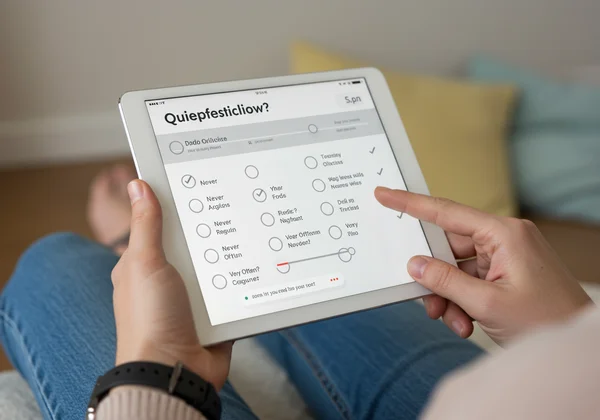ASRS Test: Understanding the Adult ADHD Self-Report Scale
September 2, 2025 | By Miles Harrison
Do you find yourself constantly losing your keys, struggling to finish tasks, or feeling an inner restlessness you can't shake? For many adults, these persistent challenges lead to a quiet, nagging question: could this be ADHD? If you're wondering how to test yourself for ADHD, this guide introduces the ASRS test, a leading self-screening tool to help you privately explore your symptoms. It's a crucial first step toward clarity, and you can try our free ASRS test tool to begin your journey of self-understanding.

The path to understanding your own mind can feel overwhelming, but tools like the Adult ADHD Self-Report Scale (ASRS) provide a structured and accessible starting point. This isn't about labeling yourself; it's about gaining knowledge and empowerment. Let's delve into what this test is, how it works, and what the results can mean for you.
What is the ASRS Scale and Why is it Used for Adult ADHD?
The ASRS scale, a questionnaire tailored for adults (18+), helps identify symptoms consistent with Attention-Deficit/Hyperactivity Disorder (ADHD). It was developed in partnership with the World Health Organization (WHO) and a group of leading psychiatrists and researchers. Its primary purpose is to serve as a preliminary screening instrument, bridging the gap between personal suspicion and professional consultation.
Unlike many online quizzes with questionable origins, the ASRS is a scientifically validated tool. It helps translate common frustrations—like chronic procrastination or difficulty relaxing—into a framework that mental health professionals recognize. By using this standardized measure, you can gain a more objective perspective on your experiences before deciding whether to seek a formal diagnosis.
The Origin and Validation of the ASRS v1.1
To understand its credibility, it's important to know about the ASRS v1.1 test. This version is a refined 18-question instrument, with the first six questions serving as a highly effective short-form screener. Developed by experts including researchers from Harvard Medical School, its questions are directly based on the diagnostic criteria for ADHD outlined in the DSM-IV (and are still consistent with the newer DSM-5).

This strong scientific foundation means the test is both reliable and valid. It has been proven effective across diverse populations for identifying adults who may benefit from a more thorough clinical evaluation. When you take the ASRS, you're not just answering random questions; you're engaging with a carefully constructed tool designed to reflect the real-world symptoms of adult ADHD. This makes it an excellent starting point for your online adhd screening.
Key Symptoms the ASRS Test Assesses in Adults
So, what does the ASRS actually measure? The questions are built around the core symptoms of ADHD in adults, which often present differently than in children. The test is divided into two main categories of symptoms that reflect these challenges:
-
Inattention: This goes far beyond simple daydreaming. In adults, inattentive symptoms can manifest as:
- Difficulty sustaining focus on tedious tasks, like filling out paperwork or completing reports.
- Making careless mistakes at work or in personal projects.
- Frequently misplacing important items such as your phone, wallet, or documents.
- Struggling to organize tasks and activities, leading to missed deadlines.
- Being easily distracted by external stimuli or unrelated thoughts.
-
Hyperactivity-Impulsivity: While adults are less likely to be physically running and climbing, hyperactivity often turns into an internal feeling of restlessness. Symptoms include:
- Feeling fidgety or unable to sit still during long meetings.
- An internal sense of being "driven by a motor" or constantly needing to be on the go.
- Talking excessively or interrupting others in conversation.
- Making hasty decisions without fully considering the consequences.
- Difficulty waiting your turn in lines or conversations.
The ASRS asks you to reflect on how frequently you've experienced these situations in the recent past, providing a clearer picture of your behavioral patterns.
How to Take the ASRS Test Online for ADHD Screening
One of the greatest advantages of the ASRS test online is its accessibility and privacy. You can complete the screening from the comfort of your home, at a time that works for you, without any pressure. Platforms like our ASRS testing tool are designed to make this process as simple and secure as possible, ensuring your responses remain completely confidential.
The process is straightforward: you'll be presented with 18 questions about your experiences over the past six months. You simply select the frequency that best describes you, ranging from "Never" to "Very Often." Honesty is key—the more accurately your answers reflect your true experiences, the more valuable the results will be. Remember, this is a tool for self-discovery, not a judgment.
Navigating Your Free Adult ADHD Self-Assessment
Taking a free adult ADHD self-assessment should be a stress-free experience. Our user-friendly platform is designed with a clean, intuitive interface that works on any device. There are no confusing instructions or complicated sign-ups required. You can simply visit our homepage and begin the test immediately.
The journey is private from start to finish. We are committed to protecting your data, so you can feel safe exploring your symptoms. This confidential environment allows you to answer openly, leading to insights that truly resonate with your lived experience. When you're ready, you can start your confidential ASRS screening in just a few clicks.

Understanding the ASRS Questions: Inattention & Hyperactivity-Impulsivity
As you move through the ADHD self-assessment, you'll notice the questions are practical and based on real-life scenarios. For instance, a question about inattention might ask how often you have trouble wrapping up the final details of a project once the challenging parts are done. A question about impulsivity might explore how often you find yourself finishing other people's sentences before they can complete them.
These questions are not designed to trick you. They are carefully worded prompts to help you reflect on patterns you might not have consciously connected to ADHD before. Each one ties back directly to the clinical criteria for inattention or hyperactivity-impulsivity, providing a comprehensive and structured evaluation of your symptoms.
Interpreting Your ASRS Test Results and Scores
After you complete the questionnaire, you'll receive your results. While many online tools simply provide a numerical score, a proper ADHD asrs test offers more nuanced feedback. It’s important to approach your results with the right mindset: this is information, not a diagnosis.
The scoring system identifies which of your responses are consistent with ADHD symptoms. A certain number of marked responses in each section suggests that your symptoms are significant enough to warrant further investigation. The score serves as a flag, indicating that a professional conversation about ADHD could be a productive next step.
What a Positive ASRS Score Might Indicate
Receiving a positive score on the ASRS assessment can evoke a mix of emotions—from relief and validation to anxiety about what's next. A positive result simply means that you have reported a number of symptoms consistent with ADHD in adults. It suggests that your daily struggles may have a name and a well-understood neurological basis.
However, it is crucial to remember this is not a diagnosis. Many other conditions, such as anxiety, depression, or even thyroid issues, can present with symptoms that overlap with ADHD. A positive score is a strong indicator to schedule an appointment with a doctor or a mental health professional who can conduct a comprehensive diagnostic evaluation.
Beyond Basic Scores: Our AI Personalized Report
This is where our comprehensive ASRS test and report truly stands out. Instead of just a number, we provide a unique AI personalized report. This advanced analysis goes beyond the basic score to examine your specific response patterns. It identifies your most prominent symptom clusters—whether they lean more toward inattention or hyperactivity-impulsivity—and provides deeper insights tailored to you.

This report can help you understand the nuances of your experience and articulate your challenges more clearly. It’s an invaluable tool to take with you to a doctor's appointment, empowering you to have a more informed and productive conversation. Ready to see what your patterns reveal? Get your AI personalized ASRS report today.
Your Next Steps After an Adult ADHD Self-Report Scale Screening
Completing an Adult ADHD Self-Report Scale is a powerful act of self-advocacy. You've taken a concrete step to understand yourself better. The ASRS test is a valuable screening tool that provides a snapshot of your current symptoms, but it is just the beginning of the journey.
Use your results, especially the AI-powered report, as a conversation starter with a qualified healthcare provider. They can perform a full evaluation, consider your complete medical history, and provide an accurate diagnosis. Whether or not you receive a diagnosis, the insights gained from this process can help you identify areas for personal growth and develop new coping strategies.
Ready to take that first step toward clarity? Visit Asrstest.com to complete your confidential ASRS test and receive your free, AI-personalized report today.
Frequently Asked Questions About the ASRS ADHD Test
What does the ASRS test for specifically?
The ASRS test is designed to screen for the symptoms of Attention-Deficit/Hyperactivity Disorder (ADHD) in adults aged 18 and older. It assesses the presence and frequency of behaviors related to the two core dimensions of ADHD: inattention (e.g., difficulty with organization, losing things, being easily distracted) and hyperactivity-impulsivity (e.g., fidgeting, feeling restless, interrupting others).
How accurate is the ASRS ADHD test for adults?
The ASRS v1.1 is considered a highly accurate screening tool. Studies have shown that it has strong sensitivity and specificity, meaning it is very good at correctly identifying adults who likely have ADHD (sensitivity) while also correctly identifying those who likely do not (specificity). However, it is a screener, not a diagnostic test. Final diagnostic accuracy depends on a comprehensive clinical evaluation by a professional.
Is the ASRS reliable, and what age group is it for?
Yes, the ASRS is a reliable instrument. Its consistency has been validated in numerous clinical and community settings worldwide. It was specifically developed and validated for adults, defined as individuals aged 18 years and older. It is not intended for use with children or adolescents, as ADHD symptoms present differently in younger age groups.
What is considered a "positive score" on the ASRS assessment?
A positive score on the ASRS is determined by endorsing a certain number of questions (typically four or more of the first six questions in Part A) at a frequency that indicates a significant symptom level. A positive score suggests that your reported symptoms are consistent with adult ADHD and that a follow-up conversation with a healthcare professional is recommended. It is an indicator for further evaluation, not a definitive diagnosis. We invite you to take the ASRS test on our site to gain a clearer understanding of your experiences and discuss them with a professional.